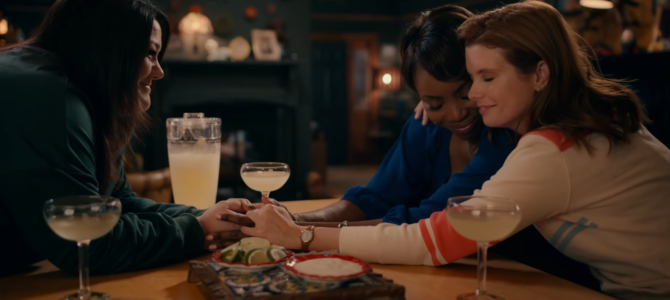
When the first season of “Sweet Magnolias” aired on Netflix in May 2020, most Americans found themselves under stay-at-home orders and executive mandates shutting down businesses states deemed “nonessential.” In places like New York and California, many of these orders stretched on throughout the year, shuttering small businesses, schools, and houses of worship.
The southern, small-town feel of “Sweet Magnolias” is already sweetly nostalgic, like reminiscing of summer afternoons spent sipping sweet tea on a porch swing. But on the other side of those devastating COVID lockdowns, the show’s reminiscence of simpler times is even more potent.
“Sweet Magnolias” follows childhood friends Maddie, Helen, and Dana Sue as they navigate divorce and heartbreak, job opportunities, and their children’s escapades in the small South Carolina town of Serenity. Don’t expect the intricate plot of a Russian novel, but the characters are lovable and the front-porch aesthetic is easy on the eyes.
Unintentionally, though, the series reflects the importance of local community ties in a year that has found them besieged. Everyone in Serenity knows each other’s business, for better or worse. But that small-town gossip schtick also means friends and neighbors are invested in each other’s lives, supporting each other at low points and celebrating each other’s high points.
Such a network contrasts the isolation so many have felt under lockdown orders, perpetuated by politicians like California Gov. Gavin Newsom, whom Netflix CEO Reed Hastings has spent $3 million to keep in office. Continuing to fearmonger or shame people into shutting out the relationships and activities that keep them involved in their communities is detrimental, not just to individuals but to the health of communities as a whole.
“Sweet Magnolias” also highlights the importance of small, local businesses to healthy communities. Dana Sue is the head chef and owner of Sullivan’s, a gourmet soul food restaurant. Her efforts to balance small business ownership, running a kitchen staff, and keeping up personal relationships with her customers showcases the rewards and challenges of running a local business.
The three women also go in together to purchase a historic mansion and turn it into a spa, fulfilling a childhood dream of becoming business partners. Central to their decision is a desire to use the building to invest back into the community. The show does a great job of celebrating the value of local businesses like the Corner Spa and Sullivan’s — but it’s bittersweet to watch in light of how many local institutions, especially restaurants and facilities like spas, salons, and gyms, have been set back or permanently bankrupt by COVID restrictions.
The show’s handling of Maddie and Dana Sue’s children also shows the importance of community involvement for kids. From baseball to mock trial to theater, their activities and extracurriculars aren’t just fun extras but opportunities for learning from the adults in their lives.
Helen’s coaching of the mock trial team gives her an opportunity to mentor her students, and Coach Cal tries to be a good friend as well as a coach to the baseball team. Those opportunities are vital, but COVID shutdowns of schools and other extracurricular activities have closed them to many kids over the past year.
Although “Sweet Magnolias” recognizes that strong community ties are bound together with strong families, it forgets that strong families go hand in hand with strong marriages. Of course, families like Maddie’s can survive divorce, and Maddie’s relationship with her kids is overall healthy and positive as they navigate dealing with her husband’s infidelity.
But any strong marriage is notably absent from the show, even though the series’ genre is romance and there is no shortage of relationship subplots. It divides any romantic relationship into either failed marriage or budding flirtation, rather than presenting any example of how a healthy marriage can strengthen friendships, professional successes, community involvement, and raising children.
Despite the inclusion of a local church — complete with a doctrinally generic, heterodoxically female pastor — and a few mentions of faith, the recognition of church families in a healthy community is pretty surface level. It’s at least positive toward the idea of religion, but the Christianity it presents is woefully watered down.
Unlike many of Hollywood’s attempts to accurately portray Southern people, “Sweet Magnolias” does a decent job avoiding groan-worthy cliches that no Southerner actually says. It gets right little details like kids calling adults “ma’am” and “sir,” and calling the parents of their closest family friends “aunt” or “uncle.” There are still a few oversaturated moments, and the costuming is a bit too brunchy for moms taking their kids to school or working around the house.
But alongside the margarita nights and white-columned porches, “Sweet Magnolias” realizes that Southern women pride themselves on their communities more than on their mint juleps. Like the similarly named 1989 classic “Steel Magnolias,” it looks past the hairspray and good-natured gossip and takes Southern women seriously.
It has its shortcomings, and a couple of leftist add-ins like a brief gay kiss from a side character. But as a simple ode to friendship and local communities, “Sweet Magnolias” is charming and refreshing at a time our community ties in real life deserve similar attention.









